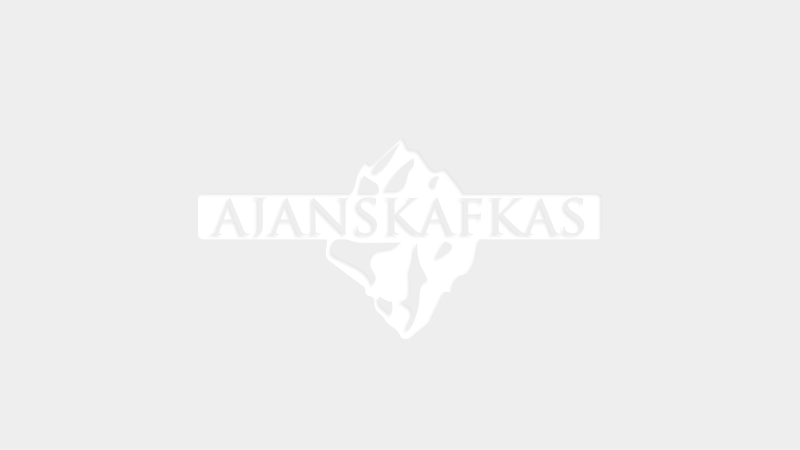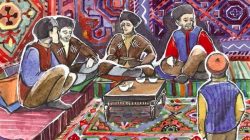
Honourable Deputies of the Lithuanian Seim,
Dear Friends,
Making predictions is said to be a thankless task, but it is nevertheless a necessary one as preventative measures depend on how a situation develops.
I don’t know whether you are aware of the long-term plans of the Kremlin and Lubyanka for the members of the Chechen Resistance, but can say without doubt that anyone who has military experience or knows how to handle a weapon will sooner or later be destroyed physically, regardless of whether they are part of the puppet structures of power or of the Resistance commanded by Dokka Umarov. This is because armed Chechens have presented and present a potential threat to the Kremlin.
But it is one thing to make plans and quite another to carry them out, and this is where things aren’t going quite so smoothly for the Kremlin.
The Kremlin has never trusted Chechens, and especially not now, when a representative of the punitive organs, Putin, is leading the country. By the way, the term “President” Medvedev doesn’t fool me. Some people will say, look, Ramzan Kadyrov is Putin’s trusted representative. Yes, he is for now, but only for now. Kadyrov’s position is temporary. Once his time is over, he will be removed without a moment’s hesitation. And the Russian special services themselves will do it, those same special services who so unceremoniously removed his father, Akhmad Kadyrov.
Everyone in and beyond knows about the enmity in the puppet power structures of Kadyrov, Kakiyev and Yamadayev. However, they are all of course subordinate to the orders of the Kremlin and Lubyanka. The time will come when
However, clashes between the puppet structures often occur outside the Kremlin’s scenario. The Night of the Long Knives will come when the Kremlin feels that the situation is slipping out of control or when one group is gaining critical mass,
Clashes between these groups have become more frequent recently. But despite the fatal hatred, some do try to avoid bloodshed because of the threat of a blood feud that can continue for many years. In this situation some prefer to flee to the mountains and join the Resistance.
In talking about the Chechen Resistance as a whole, I would like to point out that it is formally subordinate to Dokka Umarov. Why formally? Because not all our combatant brothers share Udugov’s ideology of an emirate. And this situation prevails despite Amir Umarov’s threat to cut off the heads of insubordinate mojahedin. I think that Dokka realises in his heart of hearts that his unpopular actions could weaken the Chechen Resistance – after the Resistance has been destroyed it will be easier for the enemies to deal with the emirate detachments. In other words, the Kremlin is using the old imperial principle of “divide and rule”, splitting the Resistance in the whole
It must also be said that recently many young people have been joining the Chechen Resistance. This is linked to the heightened tension in spring-summer in .
Now for a few words about the Putin-Kadyrov amnesties which serve as a way to settle scores with the former members of the Chechen Resistance. It is impossible to keep count of the numerous amnesties, or to be more accurate special operations, of the Kremlin and Lubyanka. Nevertheless, there are still trusting Chechens who believe these propaganda tricks. Veterans of the war who believe the sworn assurances of the Kremlin and their puppets lay down their arms, sign that they will not take up arms again and receive in return a piece of paper about the amnesty and go home relieved in the hope that this is the end of their misfortunes, having left their precise address.
However, it is these trusting Chechens who become the first victims of targeted sweeps by the guarantors of the “amnesty” – the Russian special services or Kadyrov’s boys who illegally arrest the recently “amnestied” Chechens. The “amnestied” Chechens are cruelly tortured to persuade them to cooperate and then they are “bound in blood”. Whoever does not agree to cooperate is either shot or disappears without trace.
What is the state of affairs amongst Chechen refugees, of whom there are around 300,000? Unfortunately, there is no agreement here. New disagreements over the proclamation of the emirate have been added to the pre-existing ones.
The emirate has also divided Chechen politicians. A minority of them, whom I consider to be our friends, have adopted a position that does not allow for the violation of the Chechen Constitution. The question arises here: if the state structure of the Chechen Republic of Ichkeria is being rejected, how can there be talk of keeping its Constitution? The proverb “If you lose your head, don’t cry for your hair” comes to mind.
This position creates confrontation with the heavyweight Chechen politicians who defend our country’s independence, including the prime minister of the Chechen Republic of Ichkeria, Akhmed Zakayev.
And now for NATO’s position on accepting new members. I am following this process with great hope – it is without doubt inevitable. After , will certainly join NATO. will not last long in proud isolation, surrounded by unfriendly states, despite
Will joining NATO affect events in and the
However, the Kremlin is in vain using as a response the scare tactics of absorbing Abkhazia and South Ossetia into . First, Abkhazia will never agree voluntarily to join – no-one should be fooled about this. Second, the Kremlin will never recognize the sovereignty of Abkhazia even to spite . The imperial Kremlin has not yet given anyone freedom this easily. Tempestuous events can be expected in the North Caucasus, which I think will have neither the strength nor the resources to cope with.
What could the new European Union countries, for example and the
No-one has the right to doubt the inevitability of punishment for criminals, however high their rank, and however powerful the state they represent. I am talking about punishment of the military and political leadership of for the genocide in . This is vital for countries that have recently shrugged off the Russian colonial yoke but remain geographically close to the Empire of Evil. Preventative measures are also required against Russian revanchism. There’s no need to reinvent the bicycle – existing initiatives need simply to be developed, especially the idea of an International Tribunal on :
“The assembly considers that, if the efforts to bring to justice those guilty of human rights abuses are not intensified, and the climate of impunity in the Chechen Republic prevails, the international community should consider setting up an ad hoc tribunal to try war crimes and crimes against humanity in the Chechen Republic, modelled on the International Criminal Tribunal for the former Yugoslavia, to be empowered to try all such crimes committed in the Chechen Republic.” Point 10 iii of Document 9732 of the Parliamentary Assembly of the Council of Europe. (http://assembly.coe.int//Main.asp?link=http://assembly.coe.int/Documents/WorkingDocs/doc03/EDOC9732.htm)
And another proposal:
“In early May 2000 in an interview with Interfax the vice-president of the Parliamentary Assembly of the Council of Europe and head of the Estonian delegation to PACE, Kristina Oyuland, declared the possibility of taking to the
for Human Rights for its crimes in . She said that any European state could take to court.”
The following questions naturally occur to me with regard to the PACE initiatives – why do the new EU members, such as Poland and the Baltic states not worry about their own security, why has no European state yet taken Russia to court? Surely the civilized West is not indifferent towards and the genocide of the Chechens? This is not how I think of my Polish and Baltic friends. I think that our friends, even now, on the eve of the 10th anniversary of the second Chechen war, could put things right, thereby showing that the Western community adheres to common human values.
We have just watched a marvellous film about by Czech journalist Jaromir Stetina which he concludes by saying that the Russian leadership must be told the truth about . But I think that this truth should be told to Western leaders too.
Jaromir Stetina, now a Czech senator, told us about the death in Groznyy of a young American journalist, Cynthia Elbaum. This tragedy happened at the start of the first Chechen war on 22 December 1994. By the way I was in this spot too, near the ring on
which was bombed by “unmarked” Russian planes.
I remembered the words of Judy Elbaum, the journalist’s mother, about the value of truth:
“Democracy and justice can triumph only when people know the truth. Thanks only to the brave and resolute actions of journalists can the world know about the desire of many governments to solve problems by suppressing opponents.”
Tell me, which Western politicians have admitted double standards about what has happened and what is still happening in
Thank you for your attention.
Mayrbek Taramov
Report for the Conference in the Lithuanian Seim, 18 April 2008
Mayrbek Taramov








